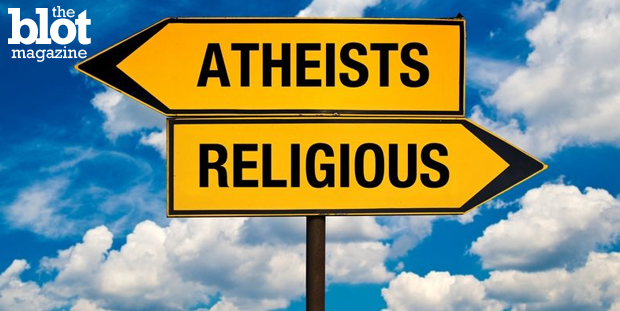
All of my life, something has been missing that so many other Americans have enjoyed and even taken for granted. What is that one thing? A sense of victimhood. You see, I am a white male from the suburbs, blue-eyed, physically unchallenged (but clumsy to be sure) and straight. Whatever discrimination I have faced in my 50+ years has been unfailingly in my favor. As a result, I have felt like an outcast, a stranger in a strange land. Until now.
Madison, Wis., a progressive town throughout its history, has decided that atheists are a class that merits protection. In a unanimous vote, the city council of Madison decided that not believing in a divine being is not grounds for denying anyone employment, housing or access to public accommodation. “It’s only fair,” bill sponsor Anita Weier told the press. “There are many categories that are protected, and it did occur to me that if religion was, then perhaps the opposite should be,” she continued.
“It’s actually something we’re commonly very concerned about, just because atheism is viewed as such a taboo in this country. And there’s such a stigma with it,” Chris Calvey, former president of Atheists, Humanists and Agnostics (AHA) at the University of Wisconsin-Madison, said. “That people in my student group, for example, are very hesitant to be honest about their lack of belief in God out of fear that they are going to be discriminated against in employment opportunities. If that came up in a job interview that’s held against them.”
Having now been declared a legally protected class, things should be easier for atheists, Calvey said, adding, “and we’ll be able to be confident that at least if we’re honest about what we actually believe, then we have the law backing us up so we can’t legally be discriminated against.”
Oh, joy! Now, I, too, can claim victimhood because I don’t believe in God. Like John Lewis and MLK on that bridge in that movie, I could be made to suffer for what I am, and that is wrong says Madison. In Madison, in fact, the list of groups protected is pretty long, “sex, race, religion, color, national origin or ancestry, citizenship status, age, handicap/disability, marital status, gender identity, and political beliefs, among others.”
There’s just one problem. I happen to believe that discrimination is a very important and vital facet of life. Deciding that A is preferable to B, discrimination, is at the root of freedom, and you agree. Unless the last time you went to a restaurant you told the waiter you’d have “whatever.” Discrimination among individuals is how we decide who our friends and our enemies are. We do things for family members we don’t do for strangers. I live to discriminate, judge and differentiate.
Discrimination is wrong when you select against people or in favor of people on the basis of things they cannot change. When it comes to things people can change, I am less certain. I would prefer a lifeguard who can swim, and society should discriminate against people who can’t swim being lifeguards. Being able to swim is a legitimate basis on which to discriminate in the hiring of lifeguards, and since it is something you can learn, no one complains about this.
When it comes to beliefs, which can change (mine have over the years), I am less certain that anti-discrimination laws are wise.
For example, I do not voluntarily shake hands with Nazis, Communists or other totalitarians. I prefer not to do so not because they were born that way but because they have chosen to be that. I don’t voluntarily shake hands with assholes either, although the former is merely a subset of the latter. I cannot prevent Nazis, Communists or other assholes from reading this column, but I certainly wouldn’t allow my work to be published in a totalitarian periodical or website.
If the publisher of Nazi America Quarterly asked me so sell him the rights to a column, I would reject the request. Why? I don’t want my work in a Nazi magazine. Have I violated his rights by not selling to him? If the title were All Races are Equal Quarterly, I would certainly take the money from the same person. Is that wrong that I would discriminate in such a way?
Should people in Madison be allowed to discriminate when it comes to hotel rooms, places at the lunch counter, etc. when it comes to atheists? Were I one of those frothing-at-the-mouth Christians intent on saving absolutely everyone, denying an atheist service might be a way to shake him or her up and consider changing their ways.
But exactly how do you tell if someone is an atheist? Is there a believers’ version of “gaydar?” Unless the person is wearing a T-shirt that reads “There is No God,” I don’t know if you can say for certain someone is. For that matter, such a shirt might be worn ironically. I know that I have shaken hands with Communists by accident, not knowing at the time that they were followers of that odious belief system but having discovered it afterwards.
By the same token, I am aware that Hollywood blacklisted a number of great artists whose only crime was being right about the Nazis before the government was. Google “pre-mature anti-fascist” if you want a good cry.
In general, I am of the opinion that my fist’s freedom stops where your nose starts. In addition, where society at large has a compelling interest in curtailing freedom, I am prepared to accept limits. Your freedom of speech doesn’t include yelling “Fire!” in a crowded theater (although yelling “theater” at a crowded fire is just fine although absurdist), nor does your religious freedom include sacrificing children to Moloch. At the same time, everyone has a right to earn a living and to feed and clothe themselves – a right I wouldn’t even deny a Nazi or a Communist.
So, I am of two-minds, or possibly three, when it comes to atheists being a legally protect class. If I were in Madison, I suppose I would be grateful for the additional protection that this law provides. At the same time, though, I’d probably wonder just what the hell I was doing in Wisconsin in the first place.
Jeff Myhre is a contributing journalist for TheBlot Magazine.






